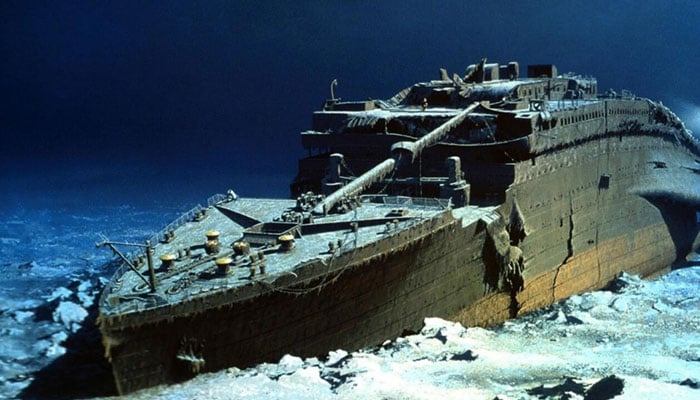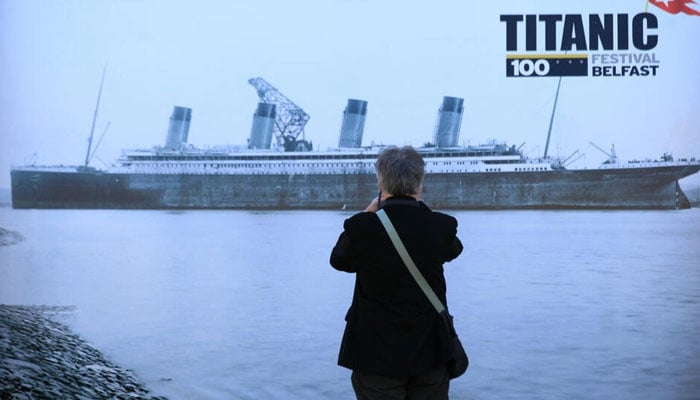Titanic: A story that continues to captivate the world
From opulent luxury of ship to exploration of its underwater wreck, Titanic's story has inspired numerous books, movies, and stage productions
The sinking of the Titanic during its maiden voyage over a century ago continues to captivate the public's imagination.
OceanGate's missing submersible, Titan, has thrust the Titanic back into the limelight, reigniting interest in the legendary shipwreck and captivating the world's attention once again.
The tragic event of the massive ship, which claimed the lives of approximately 1,500 people, remains one of the deadliest maritime disasters in history. From the opulent luxury of the ship to the exploration of its underwater wreck, the Titanic's story has inspired numerous books, movies, and stage productions. However, the recent disappearance of a submersible carrying wealthy passengers and crew on their way to visit the wreck has reignited debates about the ethics of profiting from a tragedy.
As a race against time unfolds to rescue those stranded underwater, the world watches with bated breath.
Palace of luxury
When the RMS Titanic embarked on its ill-fated journey in April 1912, it was hailed as the largest and most luxurious ship ever built. Its opulent amenities catered to the wealthy first-class passengers, who enjoyed access to facilities like a gymnasium, squash court, swimming pool, and exquisite dining options. In contrast, below decks, impoverished migrants in steerage quarters hoped for a better life in America.
The ship's collision with an iceberg resulted in its catastrophic sinking, with compartments flooding and the vessel ultimately splitting in two. The inadequate number of lifeboats led to the loss of countless lives, as the crew struggled to deploy them effectively.
Wreck
After remaining undiscovered for 70 years, the Titanic's wreck was finally located 3,700 meters beneath the ocean's surface. Subsequent explorations unveiled the ship's remnants resting amidst a vast debris field, revealing items such as furniture, shoes, and plates that were jettisoned during its descent.
Filmmaker James Cameron's 1997 movie "Titanic" further immortalised the ship, perpetuating discussions about the infamous scene where the character Jack sacrifices himself to save Rose by using a floating door. Reflecting on the enduring allure of the Titanic, Cameron emphasised its mythical qualities, grounded in themes of love, sacrifice, and mortality.
"The Titanic has this kind of enduring, almost mythic, novelistic quality. And it has to do with, I think, love and sacrifice and mortality," Cameron said, addressing a press conference held for the 25th anniversary re-release earlier this year.
"The men who stepped back from the lifeboats so that the women and the children could survive."
Tourism
While the Titanic has become a historical curiosity for many, the descendants of those who perished view the influx of wealthy tourists visiting the wreck with distaste. John Locascio, who lost two uncles in the disaster, voices his discomfort with the commercialisation of the tragedy, asserting that the victims deserve respect and privacy.
Despite such sentiments, auctions of Titanic memorabilia continue to draw significant attention, with items like Kate Winslet's embroidered pink coat from the movie and personal letters attracting high bids.
"I think it´s disgusting, quite honestly," 69-year-old John Locascio, whose two uncles died in the tragedy, told The Daily Beast.
"They died a horribly tragic death. Just leave the bodies resting," Locascio added. "They don´t want people down to see them. Just leave well enough alone."
Tom Zaller, the organiser of "Titanic: The Exhibition," acknowledges the enduring fascination with the ship, emphasising its human story and the profound impact it had on both survivors and those who perished.
The Titanic's sinking remains a haunting reminder of the hubris surrounding technological advancements and the devastating loss of life that can result from such complacency.
As the world anxiously awaits news about the stranded submersible and its passengers, it is clear that the allure of the Titanic's story, from its luxurious beginnings to its tragic end, continues to captivate the collective imagination. However, the ethical implications of profiting from the tragedy and the emotional toll on the descendants of those who perished spark ongoing debates about the appropriateness of commercialising this iconic historical event.
Lost Titan revives Titanic
Titan, OceanGate's cutting-edge submersible, was specifically designed to withstand extreme deep-sea conditions, capable of diving to depths of over 4,000 meters.
With its advanced carbon fiber hull and advanced imaging systems, Titan offered a unique opportunity for passengers to witness the haunting remnants of the Titanic firsthand. The submersible's innovative design featured a transparent acrylic sphere, providing panoramic views of the underwater world, while its state-of-the-art propulsion system ensured precise maneuverability in the depths.
Equipped with advanced sonar and mapping technology, Titan aimed to capture detailed images and collect valuable data to enhance our understanding of the historic wreck. However, its sudden disappearance has not only posed a significant challenge but also reignited discussions on the complexities and risks associated with deep-sea exploration.
-
Four people killed in stabbing rampage at Washington home
-
Jack Hughes's proximity to Trump angers Tate McRae fans
-
Nobel-winning scientist resigns from Columbia university after Epstein links revealed
-
At least 30 dead after heavy rains hit southeastern Brazil, 39 missing
-
Japan plans missile deployment near Taiwan by 2031 amid growing regional tensions
-
Trump delivers longest State of Union address in history: Inside key details on economy, security and global strategy
-
Trump’s 2026 State of Union address: Inside key takeaways, major policy shifts & top announcements
-
Rep. Al Green removed from House chamber during Trump’s State of Union address: Here’s what happened
















